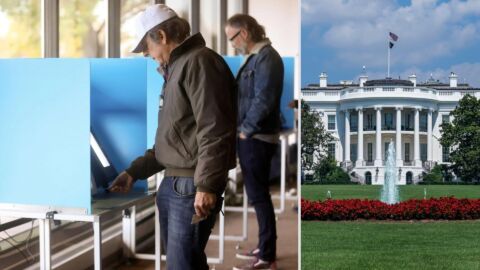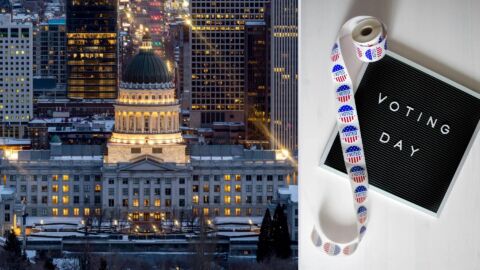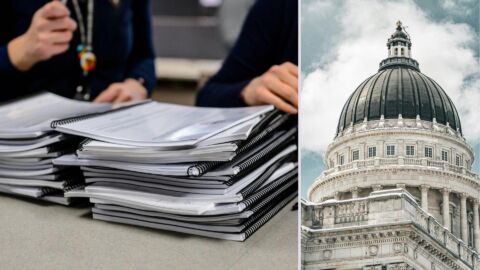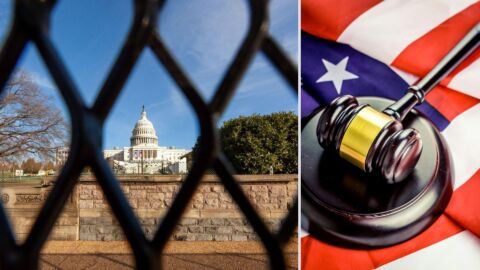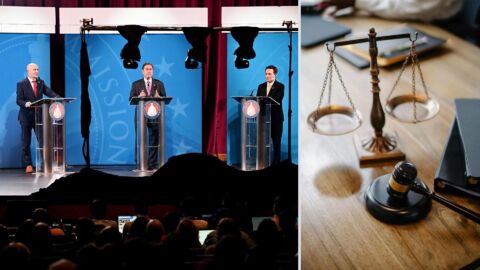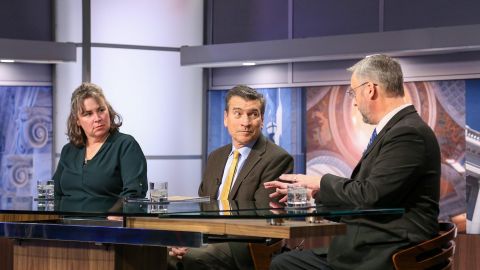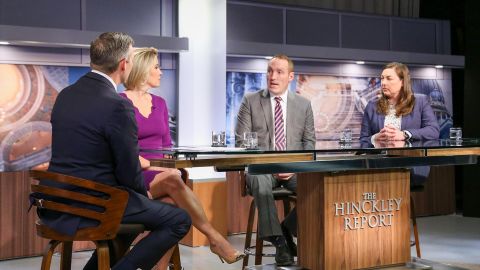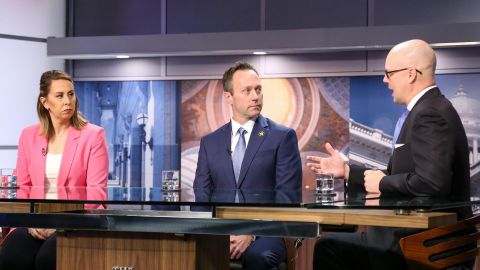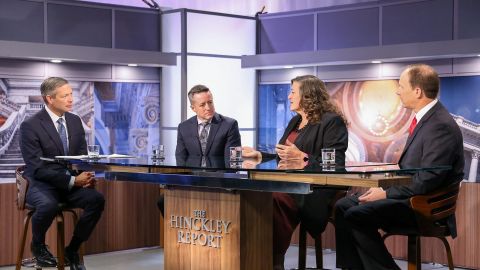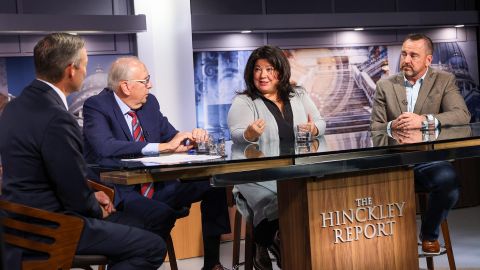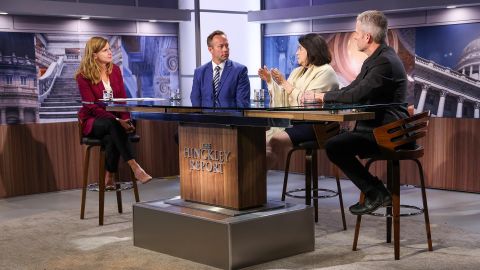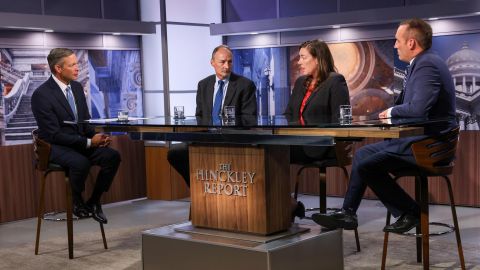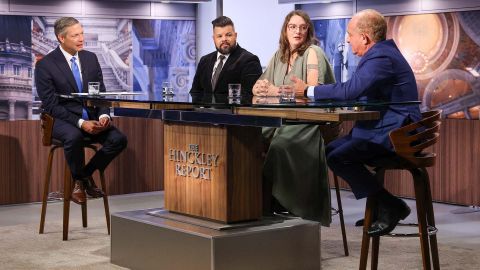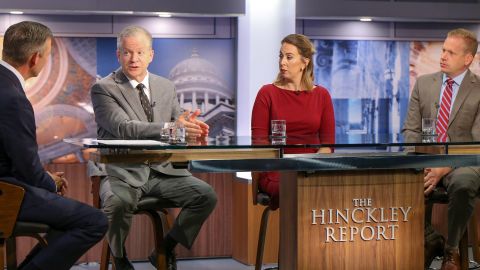announcer: Funding for "The Hinckley Report" is provided in part by the Cleone Peterson Eccles Foundation Fund, Merit Medical, and by contributions to PBS Utah from viewers like you.
Thank you.
Jason Perry: Tonight on "The Hinckley Report."
Controversy remains over Utah's presidential preference poll.
With the major party candidates solidified for 2024, undecided voters may look for another option.
And Utah officially debuts a new look as a modernized flag flies over the state Capitol.
♪♪♪ ♪♪♪ Jason Perry: Good evening, and welcome to "The Hinckley Report."
I'm Jason Perry, Director of the Hinckley Institute of Politics.
Covering the week we have Doug Wilks, executive editor of "The Deseret News"; Maura Carabello, president of the Exoro Group; and Robert Gehrke, reporter at the Salt Lake Tribune.
So glad to be with you all tonight.
There's a lot of stuff happening in politics, but really I wanna start talking about some aftermath of some recent things with our parties.
The caucus night, I'm gonna start with you, Doug, if that's all right.
So, we had our caucus night, still a lot of controversy surrounding what happened that night, and a lot of thoughts about where we're going to go for the next election cycle.
Doug Wilks: Well, clearly there was a problem.
There was only 9% turnout for the caucus for Republicans, that compares to 29% in 2016, 49% in 2020, and if you recall back then the whole thing was how do we increase voter turnout?
They went to a mail in ballot, and now we're all the way to the point where, "Wow, we've regressed."
So, the question is, why did we regress?
And what can we do about it?
Jason Perry: So, Maura, that's what's interesting about what happened.
Now, this year was a presidential preference poll, which was intended, at least from the party, to suggest more people would participate, that more people would come to the caucuses, we'd have a lot more participation overall.
That certainly wasn't the case.
Why is that?
Maura Carabello: You know, I think the parties have to decide if they want to party build or if they want to brand build and bring in Republican voters.
And I don't know that they're always the same thing.
And how you could tell the difference is if I need to drive somewhere, stay for 2 to 3 hours, you--the harder you make it for me, the less inclined I am to do the activity.
So, does the party want to continue to sort of require a lot of participation?
In which case you'll get probably very knowledgeable and very committed people.
Or do they want to open it up and have more voices being heard?
And they keep pushing and pulling on this issue of "Where do we get our fealty?
What are we doing?"
The other note I'm going to give is I will continue to advocate that local politics is very interesting, and we wrapped up this whole evening about the presidential election.
And if we would cover more in the news and if we would talk more about a really competitive US Senate race we have, all of those delegates were slotted that night, and all of that--we have great state house races.
And if we could draw more attention to multiple layers of civic involvement and not just the presidential race, I think we could get a little more engaged.
Jason Perry: Go ahead, Robert.
Robert Gehrke: Yeah, I mean, I mean, Doug asks the question of, you know, we need to answer why turnout was low.
I think it's a feature, not a flaw.
I mean, I think caucuses are designed to be exclusionary.
Like, to Maura's point, it's hard to go to these things.
It's hard for people who have kids, who have work, who have other commitments to--and then do they want to go to deal with this?
We saw the chaos that was, you know, unfolding in many of these caucuses, because the registration system was bad, the vote counting system was bad.
There were fundamental problems in it, and we've known that.
We've seen this for decades, honestly, that caucuses don't have the same level of turnout, the same level of involvement as vote by mail has shown us it does.
And so, so the party needs to decide, does it, to Maura's point, do they want to include people?
Do they want to expand the involvement?
Or do they want to keep the power in the hands of a small group of people?
And time after time after time, every time they choose caucuses, it's keeping the power in this group, a small group of people.
And if that's what they want, that's what they want.
But I think the voters need to ask themselves why that's what they want.
Jason Perry: You go back to what--to what happened in 2020, which you have 49% of the turnout, which was because of people were just submitting a ballot, which is why we get the lieutenant governor involved just a bit, because she had something to say about this.
And, Doug, I'd like to get your feedback on this quote from Deidre Henderson about where we might go in the future.
This is what she said.
"I applaud all Utahns who seek to have a say in who we elect and how we elect them.
I encourage voters to communicate with their party leaders and legislators about any changes they'd like to see for next time."
Doug Wilks: Well, she clearly made a point that, "Look, I--my office didn't have anything to do with these caucuses.
We were involved with the Democratic, you know, with the primary."
So, there's a degree of separation there, but her point is valid, you know.
Is there outrage by the electorate?
If you weren't represented, do you wanna raise your voice?
The problem that I have with this whole process is it builds apathy.
We're trying to fight against apathy.
If I myself was driving to a caucus, and I see a line that I know is a mess, and I'm not gonna get in, I'm probably not gonna stop my car and get out and go do it.
You'll say, "Well, I'll wait until the general election, or I'll wait till, you know, I have a different opportunity or a different voice."
And that's if you even know the process is going on.
We trained everyone in Utah to wait the couple weeks before the primary election that "I'm gonna get a ballot in the mail."
We had people calling our office, "Aren't we gonna get a ballot?
Aren't we gonna get a ballot?"
Because they didn't even know that there was gonna be a caucus.
Maura Carabello: And let's about how you can see that on caucus night is that the Democrats did go to a primary.
So, so lieutenant governor and the clerks managed that process.
They got all, you know, sort of 70% turnout, and it was a pretty good showing considering there was a noncompetitive race with Joe Biden being the assumed.
Here we had a good race with Nikki Haley and Trump, and the Republicans only turned out 15,000 more people, so you had a pretty good turnout when it was open and accessible and run by the elections office.
But I do think we need to start asking, Count My Vote brought up this interesting issue of what's the difference between a party which is a private entity and the state elections office?
We did have a senator post-caucus sort of open question up of, "Hey, maybe we, the legislature, should be looking at parties."
What's been interesting is the Republicans have--in the legislature have been the ones very much saying, "No, the parties are the parties.
We shouldn't instruct what they're doing."
Jason Perry: It's such an interesting point.
People often think that these things are connected so much that they're the same, which they definitely are not.
Robert Gehrke: Well, and this time it didn't matter, right?
We all knew who the winners were going to be.
It was going to be Donald Trump, he was going to be the nominee, and even if he happened to not win, he was going to eventually be the nominee anyway.
So, the consequences this time were minimal, but going forward that's not maybe always going to be the case.
And also I think it's just generally good to expand involvement as much as you can.
And, you know, and also, I just want to say the caucuses are, as I said, exclusionary, but also the people who are disenfranchised the most are women and lower-income people and minorities.
They are not--you know, the statistics show that they don't attend their caucuses, they don't attend conventions as much as a White older male like me.
So, so I think, you know, we need to look at that, and we need to expand the playing field and how we give more people a voice.
I think that's good for democracy, and I think that's the direction the party should be going.
Doug Wilks: Can I add one thing to that?
You know, picture someone in their home, taking care of children, a single mother or a single father, and you can fill out a ballot.
But if it comes upon you and you have to get a babysitter and you have to dedicate hours and you don't quite--you're not quite comfortable with the process, you're not gonna engage in the process.
This is--Robert used the term control.
This is a question of control.
There are some within each party that says, "Here's the best way for us to control the outcome," and there are others who say, "No, we need to expand and give everyone a voice.
How do we get participation?"
But there's not unanimity of opinion on what they wanna do.
Jason Perry: Since we looked at what happened here and the control did have an impact on participation, Maura, it does have also a resulting look at who came out as winners in this one.
I want to talk about that for just a minute, because it's interesting because Nikki Haley edged out former president Donald Trump in Salt Lake County and in Davis County, and it was very close in Cash, Summit, and Utah County.
Talk about that dynamic just a little bit.
Yeah, the turnout is part of it, but what bigger dynamic are we looking at?
Maura Carabello: I mean, Utah has set the standard of the Republicans at least having a discussion.
I mean, Nikki Haley did better in Utah, all but for one state in which she won.
And I think it's because if you look at past cycles, we have not been very excited about firebrands like Donald Trump.
We sort of like a more nuanced position, and something she's been very policy focused.
I think that fits what Utah voters say that they want.
But it was interesting in the turnout.
The question I think we start playing with is, what does it mean if anything for a general election, right?
I mean, if it says it wasn't an indicator of anything.
Well, I don't think any of us suspect that those Haley voters, their next stop on the train is Biden.
I think that's probably too far away for them.
They'll probably stick with the party that they came to or maybe a third party.
I think her high performance bodes well for how Utah's process, but, and you see this in poll after poll, all of us are feeling a little stuck with the choice we have in Biden and Trump.
Jason Perry: Well, how does that result, Robert?
Because the No Labels Party has come up this week saying they will field a candidate.
How would that be received?
Robert Gehrke: Just briefly, those counties, it doesn't sound like a lot in numbers in terms of the ones Haley won, but that's where the people live, so that those are important counties.
The No Labels thing, I think, is fascinating.
I don't think it necessarily is a big factor in Utah.
We've seen in the past Evan McMullin jump in, he ran a third party race, got a considerable number of votes, but didn't affect the outcome.
I think what's interesting with No Labels is how--which states does it get on the ballot in?
And are they swing states?
I mean, because in a close election, like we're anticipating this time again, you know, a couple percentage points in a swing state actually could make a difference.
I think it also matters who they pick.
You know, there's been talk of Jon Huntsman, I doubt that he'll get in because he got this new job at the credit card company.
Sounds like he's processing credit cards.
That's not what he's doing.
But it's--he said he's not running.
Joe Manchin's out.
So, part of it depends on who they actually field as a candidate.
But, you know, again, in a close election, a point here, a point there in a state like Wisconsin, Michigan, places like that actually could have an impact.
Maura Carabello: To get a little wonky on third party candidates, one fun fact about Utah is Robert Kennedy has qualified for the Utah ballot, and so has No Labels.
No Labels, interestingly, has qualified with a point--with a place positioning in 24 states, and they continue to keep going.
So, looking at third party being either a spoiler or whatever you want to think of them, Utah has qualified two non-primary candidates for our general election.
Doug Wilks: Can I add one thing to that?
I mean, we had Nikki Haley in our office five days before the caucus, and she kept talking about this statistic, 70% don't want Donald Trump or Joe Biden.
So, I think it is time to have a conversation about is the two-party system yielding the result that the majority of Americans want?
Is there some other way to access more than a Republican and a Democrat?
And over time there's been, you know, throughout history trying to get a third party candidate, but it always starts from the position of they can never win.
So, is it about money that needs to change?
Is it about process that needs to change?
Because there are people who want to cast a vote for someone other than perhaps a Republican or a Democrat, but it becomes a vote that they know is not gonna necessarily make a difference unless it's a spoiler vote.
I'm with Doug on this.
I think we need to really look at the two-party system.
Is it giving us what we want?
Because it's not.
People are not, you know, like light switches.
These issues are complicated and nuanced, it's not an on or off thing.
It shouldn't be blue or red.
And so, I think, you know, yes, I think a third or fourth or fifth party would be great, but also the two parties run the show, they make the rules, they make it harder for people to get in, they control the money, and as Doug said, you know, sometimes they can't win.
And we always have this thing where we start running a third party candidate for president, we don't run them for city council, we don't run them for state legislature, we don't run them for governor.
We don't build the groundwork for a third party.
So, maybe we'll start seeing that because of the people are so disaffected with the two choices that they have this time.
Jason Perry: So, Maura, this is a little bit of what we saw with Evan McMullin.
It was an alternative choice, which people just wanted the alternative choice.
Do any of these potential third parties seem to be able to capitalize on that?
Is that where we are, the options are so, you know, that's not what we're looking for, so we will go vote for someone else?
Is this that moment?
Have we hit it?
Is it even better than it was for Evan McMullin?
Maura Carabello: Well, to Doug's comments, it gets too complicated for us, because--so you're looking at universally in polling right now, Robert Kennedy is averaging about 15%.
That is as good as we have seen this early.
And we also know that No Labels, an interesting component to No Labels is they are somewhat a never-Trumper organization.
So, the problem is just even by my commentary, we don't view them as the front runner, potential winner, we start to say, "What's their overall impact on the race?"
But I think what Robert said is incredibly important and worth repeating.
If we don't change our habit, our outcomes will never change.
And so, at what point--I think Evan McMullin did--had a great showing in Utah, although not nationally.
And I think we do need to start considering, it's always an interesting impact on a mirror.
We complain about politics all the time, but the longer I'm in it, I do see it as a reflection of us.
And so, instead of externalizing what we don't like about politics, maybe thinking about what behavior should we change?
Should we take a risk on a third party?
Should we vote for someone who is not in our traditional party?
Should we mix up our point of view on a brand label and stay more with our values and stay more with the issues that we care about?
Doug Wilks: That does allow you to vote your conscience, right?
If you have Nikki Haley, if you have a No Labels candidate, you can make a determination, "Well, I'm pretty sure that Donald Trump is going to carry Utah, but for me personally, I will vote, you know, speaking generically, and not telling you my vote, but I'll be able to vote for this person or this person, I'll vote for my conscience.
I'll feel okay."
And if enough people do that, then your neighbor is going to say, "Wow, we're all not just thinking alike, and maybe four years from now, eight years from now, maybe something does start to move."
Robert Gehrke: And wouldn't it be amazing to have rank-choice voting, where you could actually vote for the candidate you want, whether it's a Libertarian or No Labels or whatever, and still be able to have an influence on the outcome of the election?
I think it's--I think this is why people are making this argument, because there is so much dissatisfaction with the two-party system.
Jason Perry: I wanna get to this point from Maura about the reflection of us to a poll that you did.
All right, Doug, which is so interesting, because you did this, "The Deseret News" with HarrisX, and the question was "To what extent does Donald Trump reflect your personal moral values?"
I'm curious about why you asked the question that way, particularly given a couple these results among Republicans.
This is for Donald Trump: 38% said a great deal, 41% said some, 12% said not much, 9% said none.
As opposed to the Democrats-- does Donald Trump reflect your moral values?-- 11% said a great deal-- this is Democrats-- 13%, some; 9%, not much; and 67%, none.
Explain this to us through this question of moral values.
Doug Wilks: Well, this started with Iowa, Iowa Republicans had a choice.
So, here you have these series of Republican candidates, and they went overwhelmingly with Donald Trump.
So we said, "That's so interesting.
What is driving this, why?"
There's not a default, the election wasn't decided yet, this was the beginning.
They know they set the stage, and so Donald Trump is appealing in some ways.
So, we wanted to try and ask a character question, a values question.
What I think this determines is there's more mining to be done, because if you're talking about character, people say, "Yeah, I don't like his character, but he'll do what I want him to do."
Values, how are they interpreting values?
"I would prefer the values of what he's doing compared to what the Democrats are doing, or I don't like where the country's been for the past, you know, four years.
It'll be better--you know, it was more expensive to buy eggs, more expensive to buy bread, more expensive to buy meat.
Gas went up, it's come down a bit."
But anyway, the inflation question drives a lot.
So, I think we really have to determine character versus values, and I'm not sure we got 100% at it with this poll.
Jason Perry: Thoughts about that, Maura?
Maura Carabello: Yeah, I mean, I love the follow up of what is the difference between values, morals, and character, and how people interpret it.
I think it is a reflection of our politics.
Our politics right now are highly emotionally driven, and so your emotions also probably need to align, in many people's mind, with your political choices, because we're speaking so emotionally.
And it's a lot of us-and-them right now, and "I'm saving things, you're destroying things" is the language.
Given that, it would make sense that people would say, "I'm inclined to like his policy, so therefore it would make sense to me at a personal level to align with his morals--" or perhaps better said, probably, his policies.
Robert Gehrke: I think we used to live in a world where our morals and our values drove our politics, and now our politics are driving our morals and values, I think.
And it's probably not a good place for us to be as a country, frankly.
The distaste and resentment for the other guy, thinking they're an immoral person versus just disagreeing with them on policy is, I think, a bad road for us to be going down.
I think it also shows that people don't necessarily care that much if they view the person as moral.
You know, in the case of Donald Trump, obviously, with the affairs and the fraud and things like that, people are willing to set that aside because the other guy they think is worse from a policy standpoint.
So, I think it's a fascinating question, and it says a lot more about us as Utah voters than it does about the candidates, necessarily.
And I think it shows that, you know, there's a--this dissonance that has always maybe existed and to some extent, but now it's, you know, bigger than ever.
Doug Wilks: We're trying to frame now, you know, what do we do as a media group?
You know, what does Robert do?
What does "The Deseret News" do?
And now we know who the candidates are.
We have lots of experience with the candidates.
We better find out what the people are thinking and how they're thinking.
What are the best strategies to do that?
Maura Carabello: Interesting to know if we have a different standard of the who part at a local level than we do at a congressional or presidential level.
Are we still holding on to the individual counts or character counts at a local level where, I agree with Robert, that seems to have gone away as a calculation in national politics?
Robert Gehrke: And to tie it back into what we were talking about before, I think maybe the morals and values might matter more if there were other viable options for people.
I think, you know, if you have-- if you could get a candidate who is moral and has values that you share and also policies that you share, you might vote for that person.
But, you know, we've seen now we've got the two.
Jason Perry: Before we leave, I still want to get your comment on the same question you asked about President Joe Biden to see how that changes just a little bit.
Sixty-six percent of Republicans said does not reflect their moral values.
As opposed to Democrats, 43% said they--does reflect a great deal.
Doug Wilks: It makes sense to me.
If you start to talk to--go have a conversation, and if you talk to someone who's a Trump supporter, the first thing they'll say after you do a litany of whatever you're complaining about, they'll say, "Well, what about Joe Biden?
What about his son?
What about the--what's occurred here, here, and here?"
And they'll think that the Democrats are just attacking Donald Trump.
If you go to a Biden supporter they'll say, you know, "Biden at least steadied the ark.
He's trying to do the right thing," and then the Trump supporter will go, "Really?
What about this, this, and this?"
So, I think the way you described it, Robert, is really smart.
It's, like, we've changed now that here's the politics, now we have to layer that on top of character and value.
Maura Carabello: The analysis seems more clear, seeing the equal response on Biden as Trump as the calculus is, "I'm good.
You're bad."
So therefore, when you ask Robert, he says, "No, I'm good.
She's bad."
And that just seems to have been the analysis.
Doug Wilks: This poll is a starting point, I think.
Robert?
Robert Gehrke: Well, and I think it would be interesting if you're going to a follow up question to ask how people see Mitt Romney, if he shares their values, because he used to be the choir boy, right?
He used to be Utah's favorite son, and now he's sort of on the outs, there's been a jihad declared against him by Donald Trump.
He wants him out of the party and, you know, out of politics forever.
And so, you know, again, I think people still share Mitt Romney's values, but again, they've fallen out of favor with his politics and his policies.
Maura Carabello: And because we continue to conflate the terms character, morality, values, and policy and those are conflating, albeit very different calculations, I think that's where the interesting follow up would be.
Doug Wilks: And we haven't even talked about the Senate race.
We have a very interesting Senate race.
You have pretty strong candidates, and there are slices of the Republican party, so which slice is going to prevail in this election?
Jason Perry: A very interesting commentary.
I want to talk about a couple of pieces of legislation, some issues that are happening in the state of Utah.
The one that we've been following a little bit, we're going to start seeing a little more visually, Maura, is we officially--it's just become official this week--have a new state flag.
Talk about that, because it wasn't without some controversy.
Maura Carabello: It wasn't without some controversy.
It's been going on for a while.
So, here are my takeaways.
I think that, by and large, there's a huge coalescing around Utahns that say, "It looks great, I love it."
And I can give a shoutout to what I think is a very super minority who did a great job exercising their objectives.
They organized, they got a lot of press, they went and filed a lawsuit, they exercised all of their ability to have that conversation.
I do think the majority like the flag, or at most are agnostic to it.
And I think it'll be nice to sort of move beyond.
And remember, there was a caveat in the legislation that said if you really love the old flag, then fly that as well.
Jason Perry: Go ahead, Robert.
Robert Gehrke: Yeah, I mean, I was skeptical of the new flag when they started the process.
I'm like, why are we wasting our time with this?
I think it's turned out great, and--but to Maura's point, I think I agree with everything she said.
I think the small minority managed to gin up a lot of noise, and, you know, it was pretty clear from the get-go that it wasn't actually going to go their way.
They weren't going to get their old flag back, although they can still fly the old flag.
I don't know that before this whole thing started, anybody really cared which--what the flag looked like or even knew what the flag looked like.
I mean, that was what Senator Dan McCay would say, he'd go meet with people and ask 'em to point out, you know, if they want to keep the seagull, and he's like, "Well, there's not a seagull on it."
So, you know, so, I--it's at least maybe we've had a discussion about it.
You know, we've got to a point where one side's prevailed, it appears, and we're gonna have this flag, and it looks good on T-shirts, and that's--it's partly--it's mostly just branding.
That's what a flag is, right?
Maura Carabello: One thing it did show is that sort of my day job is communications, and one of the key things we focus on are symbols.
Symbols are in many ways the most powerful form of communicating with each other.
And I think that's what this unexpectedly tapped into, is not even sort of the art of it, the graphic design of it, but it started to represent these symbols for people and how they were relating much beyond.
And so, it does show how important symbology and symbols are for us.
Doug Wilks: Nice use of the word "symbology."
I appreciate that.
You know, what's the flag?
The flag is now the beehive.
You have a dominant image, it has great historical significance for Utah, it represents industry, so in that sense, I think it will be important to individuals, whereas the old flag maybe was only important to people who really understood it.
And it doesn't eliminate the old flag, so it becomes historical, it becomes progression.
And in that case, I think the process probably now where we are now, it's probably been successful.
Jason Perry: Okay, and just the final couple of seconds of this, Maura, are we going to see another legal challenge or is this settled?
Maura Carabello: I think it's settled.
I think you can buy your T-shirt, it's okay, we're gonna keep it.
Jason Perry: What were you gonna say, Robert?
Robert Gehrke: Yeah, I mean, I think there will probably be people who make a run in the legislature to try to get it back.
Phil Lyman was sponsoring a bill, I think, to reverse it.
I don't think it's gonna go anywhere legitimately.
And to Doug's point, yes, beehive is there, but we also have these canyons, mountains, sky.
I think it turned out really well, represents what a lot of what Utah is.
Jason Perry: It's gonna be all over now, all over the state.
Thank you for your insights this evening, and thank you for watching "The Hinckley Report."
This show is also available as a podcast on PBSUtah.org/HinckleyReport or wherever you get your podcasts.
Thank you for being with us.
We'll see you next week.
announcer: Funding for "The Hinckley Report" is provided in part by the Cleone Peterson Eccles Foundation Fund, Merit Medical, and by contributions to PBS Utah from viewers like you.
Thank you.
♪♪♪ ♪♪♪

